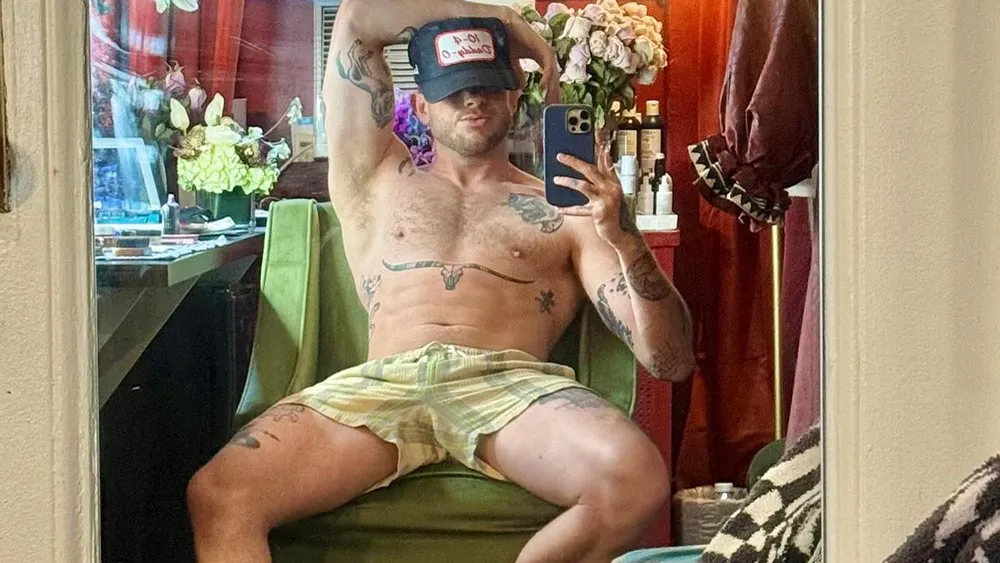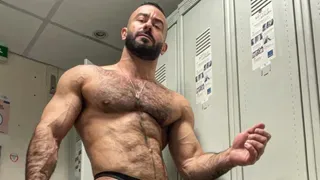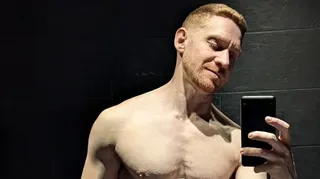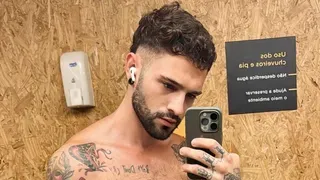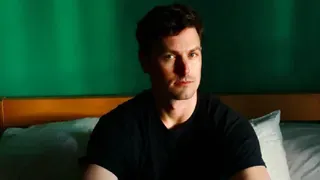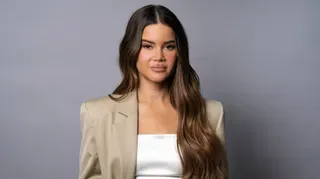March 17, 2023
@SXSW Day Three – Queer Voices (and Kiefer Sutherland)
Matthew Creith READ TIME: 7 MIN.
The third day of SXSW is always an interesting one. After a couple of days of walking around downtown Austin, rushing to grab a seat to witness world premieres, and attending events sponsored by streaming services, the third day can often be a relaxing one. Combined with the fact that the Academy Awards aired live during some screenings, crowds tend to take a break to recharge.
Not me.
I started the day by standing in line at Austin's Stateside Theater for the premiere of the new Paramount+ television series, "Rabbit Hole." The spy thriller stars actor Kiefer Sutherland as a private espionage agent caught up in a scheme that sees his character framed for murdering a government official. The series is very on-brand for the veteran performer who has dealt with his fair share of conspiratorial shows like "24" and "Designated Survivor" during his career on television.
Sutherland portrays John Weir, an Olivia Pope type who runs a team of experts that take on mysterious cases for clients who need to perform a bit of corporate espionage. Weir is a charming lead character that trusts no one, often haunted by flashbacks of his secretive father, who died when he was a child. But when Weir is framed for murdering a U.S. Treasury official, his world is thrown for a loop, and he tries to uncover the truth.
Known for dabbling in television shows full of conspiracy theories and yelling at people to get information out of them, Kiefer Sutherland is perfect in the role of John Weir. The show is aided by a calm performance by actor Enid Graham who plays FBI Financial Crimes Agent Jo Madi, an old hat at following Weir and the various crimes he's committed in his espionage career. Jo is queer and represents a lifeline for Weir if he can trust her long enough to take advantage of her intelligence and assistance.
"Rabbit Hole" premiered at SXSW with the first two of eight episodes that will be released on Paramount+. At the premiere, co-creator Glenn Ficarra acknowledged how similar the show is to some of Sutherland's previous work. He developed the series alongside writer John Requa as a response to recent political events immersed in conspiracy theories and misinformation. He noted that the current political climate often undermines the government and our institutions in the United States. They chose to create a series that borrows from the type of paranoid thrillers filmed in the 1970s.
The show represents one man fighting for justice in an increasingly less democratic world, which Sutherland seems to have specialized in for the past two decades on television. It is a fast-paced show full of more twists and turns than anything the actor has attempted before and very much reminds me of the early days of "Scandal." The ensemble cast includes Meta Golding, Jason Butler Harner, Rob Yang, and Charles Dance.
Next up was "Queendom," a chilly documentary from director Agniia Galdanova that had its world premiere at SXSW. The film follows Gena, a 21-year-old queer artist from a small town in Russia who dons ethereal costumes created from discarded materials and duct tape while protesting against the government on the streets of Moscow. Having grown up in a remote Soviet gulag outpost, Gena's public performances are a radical blend of art and activism intended to alter perceptions of beauty and queerness while drawing attention to the mistreatment of the LGBTQ+ community. Her art is often rooted in her subconscious's queer and enigmatic aspects, yielding haunting, bizarre, and emotionally resonant results. Gena protests knowing her life is on the line, and high-level risks come with being open about her identity in a country like Russia.
Gena is exceptionally tall and noticeable in any town, regardless of what country she is in. Having never left Russia before, she sports a full face of white makeup painted on for effect, walks in red high heels, and is told by passersby that her "lingerie is showing." She's never left Russia but expresses her identity (which is non-binary) through the art she creates on the streets. Gena makes a statement just by being herself. She wears an extreme amount of makeup and is draped in elaborate costumes she makes with her own two hands. Scenes of her walking through a store, minding her own business, while security escorts her out for looking the way she does is soul-stirring, to say the least.
In "Queendom," director Agniia Galdanova introduces the world to an entity that goes by the name of Gena. She is not the classic "man" that Russia expects her to be, which is typically the dull masculine figure that works in jeans and keeps to himself. Gena doesn't identify with any gender or orientation and goes by the pronouns of she/her. Her family has come to understand her slowly, and she achieves small victories in her artistic endeavors. But she is challenged with every step she takes, and the documentary does a fantastic job of representing these troubling times for LGBTQ youth in Russia.
With her life at stake, she participates in this documentary so the world can see the struggles of LGBTQ people in Russia, who are forced to crawl back into the closet in fear for their lives. It's a poignant look at people who go against the grain, risking it all for a day they hope will grant them freedom.
Lastly, I caught another documentary entitled "Who I Am Not," from director Tünde Skovrán. Keeping with a trend of queer films that speak to a new generation of LGBTQ people looking for truth and understanding, this film centers heavily on the Intersex community. Often they are folks who haven't had a voice, but this film examines the lives of several people who live each day the best they can.
"Who I Am Not" begs for an answer to the questions, "What makes a male, what makes a female, where do we draw the line, and why does it matter?" In its North American premiere at SXSW, the documentary follows a beauty queen named Sharon-Rose Khumalo, who has male genetics but struggles with gender dysphoria. Along for the ride is Dimakatso Sebidi, a male-presenting intersex activist. The two parallel but divergent stories are an intimate look at the struggle of living in a male-female world when these two people feel they are neither.
The documentary presents a couple of varying storylines for these characters, ultimately giving a platform to a portion of the population that hasn't felt seen for one second. It is estimated that two percent of the world's population is intersex, and many are born with both male and female genitalia. Their parents have to decide at birth what gender they want their baby to be.
Imagine that you are one of these people, and your parents' decision when you were born was wrong. Or, worse, they made the right decision, and you still don't feel you identify as male or female. It's a complex situation for many people living in today's society, one that "Who I Am Not" demonstrates on a fundamental level.
In learning more about Sharon-Rose and Dimakatso in South Africa, it was heartbreaking to go on this journey of authentic self-discovery with them. At one point, they attempt to explain that their existence affects their families, meaning that just being alive is an issue for them. Not that their parents didn't love or want them, just that being themselves was a complicated condition of sorts. Tünde Skovrán is careful to tell these stories with a steady hand, knowing full well that this is a hot-button issue and continues to be for many.
"Who I Am Not" weaves an elaborate web of cases that seek to identify a minority of people that many don't believe exist. But they are here. They breathe the same air we do. They look for employment, even when prospective employers dismiss them because they don't want to deal with changing workplace policies to fit intersex staff. While it isn't necessarily their responsibility to educate the public about intersex individuals, the two case studies reflected in "Who I Am Not" feel that finding peace in understanding their lives is essential.
Our DNA or our chromosomal makeup can't characterize us. "Who I Am Not" teaches its audience that we can only be defined by ourselves and what we say we are. It's a powerful message that triumphantly carries on through the end of the film.
